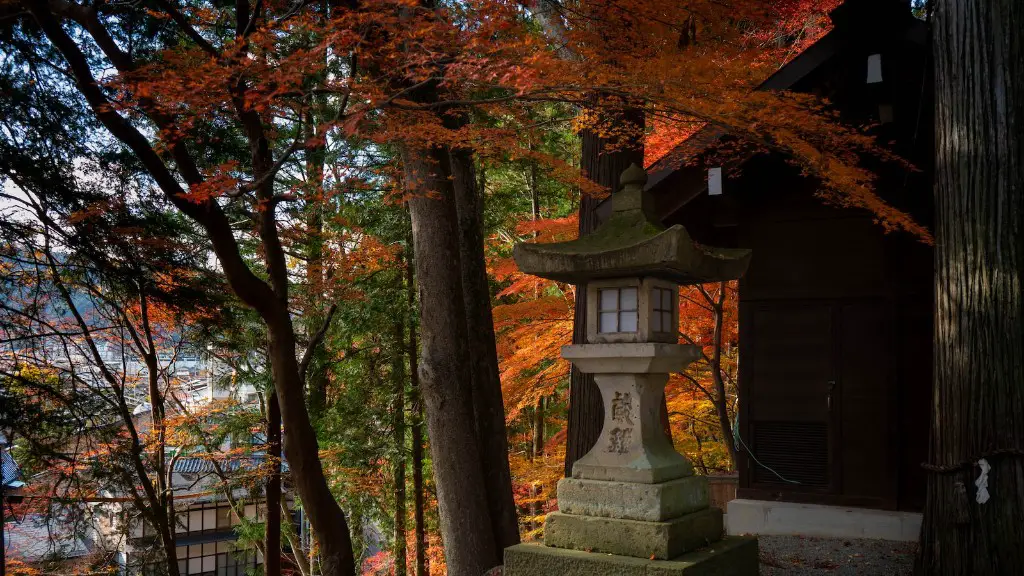What Is The God In Hinduism
Hinduism is a religion of many gods and goddesses. Though some believe in one supreme power, others may worship multiple gods and goddesses. How many and which gods are worshipped in Hinduism? This article will provide an overview of the gods in Hinduism and what they represent in this religion.
In Hinduism, the gods can be described as part of a triad, which includes Brahma the creator, Vishnu the preserver, and Shiva the destroyer. The gods are seen as powerful and with specific purpose and roles in the universe. Brahma is responsible for the creation of all living things, Vishnu for preserving the created world, and Shiva for destroying the old to make way for the new. In addition to the triad, there are many other gods and goddesses who bring prosperity, knowledge and strength to believers. Some of these include Ganesha, the god of beginnings, Lakshmi, the goddess of wealth and prosperity, and Indra, the god of rain and storms.
In Hinduism there is also a concept of worshipping different gods in different forms. For instance, some believe Shiva is the same as Vishnu and the forms of these gods may cross over depending on the faith of the worshiper. This can make the number of gods worshipped in Hinduism almost innumerable. While there are many gods recognized by all Hindus, there may also be regional or tribal gods and goddesses favoured in different Hindu communities.
According to the sacred Hindu texts, the gods are like the five fingers of the hand. Each finger has its own unique function and power. The gods are like this in that they each have specific functions and powers, but it is said that they are ultimately a part of one whole, one supreme power. Thus, the gods in Hinduism are seen as part of a greater unified force.
The gods are also seen as signs of hope and power to the Hindu believers, who pray and do puja to these gods. In a sense, the gods are seen as symbols of power, strength, and protection that one can turn to in times of need. In Hinduism, the gods are given divine powers and it is believed that worshipping them can bring good fortune, health, and success.
The idea of multiple gods in Hinduism can be confusing for some. However, as previously mentioned, most Hindus see the gods as one united power, with many aspects and roles. The gods act as a reminder to what is important in life, and worshipping them can be seen as an expression of respect and love for the divine power in the universe.
In conclusion, the gods and goddesses in Hinduism are symbols of power and hope for those who follow this ancient religion. Each god has a specific role and purpose, and acts as a reminder of the divine power that exists in the universe. Hindu believers may worship multiple gods, recognizing them as part of a unified force and reverencing them as signs of hope and protection.
Ganesha – God Of Beginnings
Ganesha is one of the most popular gods in Hinduism and is seen as the remover of obstacles and the god of beginnings. He is typically depicted with the head of an elephant, and is often shown with four arms and mounted on a mouse, who can be seen as a symbol of humility and intelligence.
Ganesha is an important deity in Hinduism and is worshipped all over India. He is seen as the one who clears the pathway for success, courage and progress in life. He is also believed to bring wisdom and understanding to those who pray to him. Ganesha is sometimes referred to as the lord of success, and is believed to help his followers with difficulties and hardships in their lives.
Ganesha is often thought of as the god that can help protect and guide Hindu believers through difficult times. He is also seen as the bringer of good luck, and some Hindus turn to him when they are in need of fortune and success. In some Hindu religious ceremonies, worshippers turn to Ganesha to bring blessings of prosperity and good luck to the worshippers.
Ganesha is an important figure in Hinduism and is seen as the provider of safety and security. He symbolizes the power of the divine and is an important character in Hinduism. Hindu believers all over the world revere Ganesha and turn to him for help and guidance in their times of need.
Lakshmi – Goddess Of Wealth And Prosperity
Lakshmi is the Hindu goddess of wealth and prosperity. She is often depicted as being seated on a lotus flower and with four arms. She is seen as the bringer of good luck and is associated with prosperity and abundance. The goddess is also closely associated with the god Vishnu and it is believed that their combined energy brings prosperity and abundance.
Lakshmi is a popular goddess and is worshipped during major Hindu festivals like Diwali. Devotees turn to her in times of need, as they believe that her presence will bring them blessings of material and spiritual wealth. It is believed that Lakshmi can grant any wish if it is presented with sincerity and humility.
The idea of Lakshmi is closely intertwined with Hindu beliefs of karma and dharma. Hindu believers pray to her in order to receive good karma and to stay on their path of dharma. It is believed that worshipping her brings peace and abundance, and helps one to stay on the path of righteousness and truth.
Lakshmi is an important goddess in Hinduism, and many Hindus believe in her power to bring fortune and success if one turns to her with devotion and faith. Offerings are made to her in the form of flowers, incense and prayer, in order to receive her blessings and protection.
Indra – King Of The Devas
Indra is the king of the Devas, the gods of the Hindu pantheon. He is seen as a symbol of power and strength, and is often depicted as riding a white elephant. Indra is associated with rain, thunder and storms and is believed to have the ability to bring light to the world.
In Hinduism, Indra is revered as an important figure and is seen as a protector of humanity. He is seen as a powerful deity who has the ability to protect those who turn to him for help. He is often seen as a god of prowess and strength, and is said to bestow freedom from fear and sorrow.
Indra is also associated with fertility and abundance, and is said to bring rain and prosperity to those who worship him. Indra is believed to be the ruler of the heavens, and is thought to be able to grant wishes and protect his devotees from harm. He is also said to have the power to grant success and prosperity to those who ask for it.
Indra is an important god in Hinduism, and his influence is seen throughout the religion. He is often seen as a protector and bringer of luck, and Hindu believers revere him as a powerful and benevolent figure. He is also seen as a symbol of strength and courage, and is believed to be able to bring fortune and good luck to those who turn to him in times of need.
Kali – The Dark Goddess
Kali is the Hindu goddess of death and destruction. She is often depicted as a dark and powerful figure with four arms and a necklace of skulls around her neck. Kali is associated with chaos and destruction, and is believed to have the power to bring change and transformation to the world.
Kali is an important figure in Hinduism and is seen as a protector of humanity. She is often seen as a goddess of transformation, as her presence is believed to be able to bring about change. Worshippers turn to her for protection and guidance, as they believe that she has the power to bring them success and fortune.
Kali’s dark and powerful nature is seen as a symbol of strength and courage. She is seen as a destroyer of evil, and as a protector of the good. Hindus believe that she is able to bring them good luck and fortune, and that her power can help them to overcome any hardship they may face.
In conclusion, Kali is an important figure in Hinduism and is seen as a powerful and benevolent protector. Her dark and mysterious nature is seen as a symbol of power, courage, and transformation. Hindus believe that worshipping her can bring them success, prosperity, and good luck, and she is seen as a source of protection and guidance for those who turn to her in times of need.
Hanuman – The Monkey God
Hanuman is a popular figure in Hinduism and is often depicted in the form of a monkey. He is seen as a symbol of power, strength and courage, and is believed to be an avatar of Lord Shiva. Hanuman is worshipped by Hindus all over India, and is seen as a source of strength and protection to those who turn to him.
Hanuman is also seen as a loyal and devoted follower of Lord Rama. He is said to have helped Rama in his battle against the demon Ravana, and to have saved Rama’s wife Sita from captivity. Thus, he is often seen as a symbol of loyalty and devotion, and is a popular deity among many Hindus.
Hanuman is believed to be a god of strength and courage, and is said to be able to give strength and power to those who worshipper him. He is also seen as a god of knowledge and wisdom, and is believed to be able to give his devotees the insight and understanding to make the right decisions. Additionally, Hanuman is also said to have the power to bring success and good fortune to those who turn to him.
In conclusion, Hanuman is an important deity in Hinduism and is seen as a powerful and benevolent protector. His loyal and devoted nature is seen as a symbol of courage, loyalty, and strength. Hindus believe that worshipping him can bring them success, prosperity, and good luck, and that his power and protection can help them to overcome any hardship they may face.
Vishnu – The Preserver
Vishnu is an important god in Hinduism and is seen as the preserver of the universe. He is often depicted with four arms and is often seen with his consort, the goddess Lakshmi. Vishnu is believed to have taken ten different avatars in order to protect the world from evil forces.
Vishnu is seen as a symbol of power and strength, and is believed to be able to bring peace and protection to his devotees. He is also seen as a bringer of good luck, and some Hindus turn to him when they are in need of fortune and success. In some Hindu religious ceremonies, worshippers turn to Vishnu to bring blessings of prosperity and good luck to the worshipper.
Vishnu is also closely connected to the idea of karma and reincarnation in Hinduism. He is believed to bring justice and order


